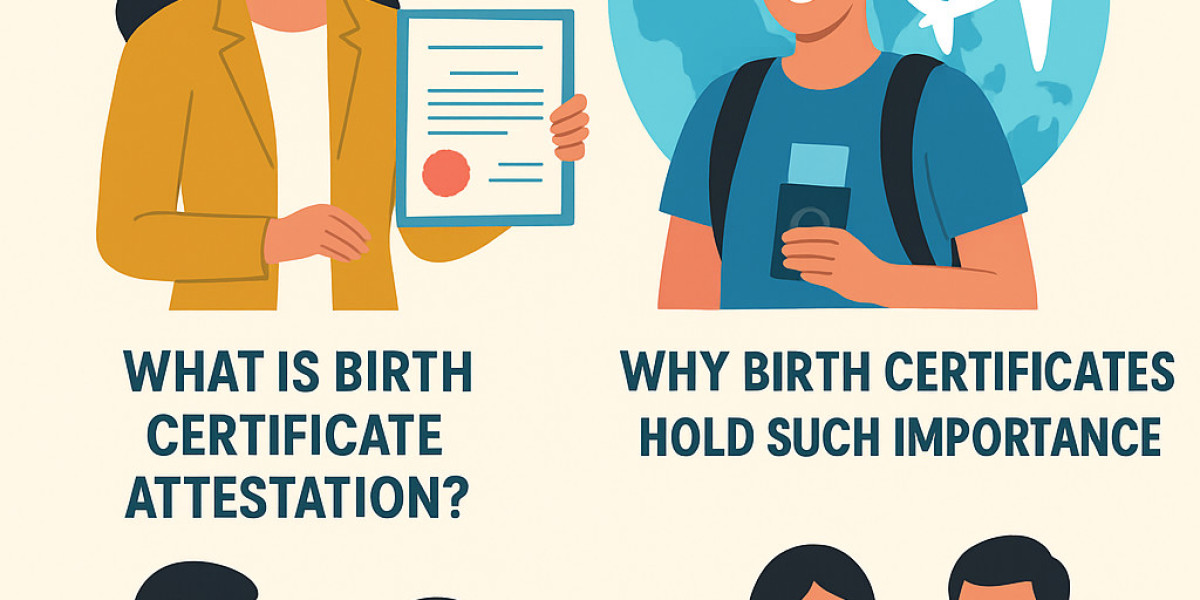In today’s interconnected world, international travel has become more than just a luxury; it is often a necessity. Whether it is for pursuing higher education, securing a job abroad, migrating with family, or even applying for permanent residency in another country, individuals need to submit various personal documents. One of the most crucial among these is the birth certificate. For Indians planning to travel overseas, simply possessing a birth certificate is not enough. Foreign authorities and institutions require it to be legally verified, a process known as birth certificate attestation. This process transforms a simple personal document into an internationally recognized proof of identity, age, and nationality. Understanding why this attestation is essential helps travelers avoid unnecessary hurdles and ensures smoother experiences abroad.
What is Birth Certificate Attestation?
Birth certificate attestation is the process of authenticating the document so that it is legally valid in a foreign country. In simple terms, it is a verification procedure carried out by government authorities and embassies that confirms the genuineness of the birth certificate. This attestation involves several steps:
Verification by local authorities such as the municipal corporation or registrar where the birth was originally registered.
Authentication by state-level bodies, typically the Home Department or the Secretariat.
Certification by the Ministry of External Affairs (MEA), which is the highest government authority for international document legalization.
Final attestation by the embassy or consulate of the country where the individual plans to travel.
Through these steps, the birth certificate becomes internationally acceptable, ensuring that it is not questioned by immigration officials, universities, or foreign employers.
Why Birth Certificates Hold Such Importance
The birth certificate is one of the first official documents issued to an individual. It records essential details such as name, date of birth, gender, and place of birth, as well as the names of parents. For international purposes, this document acts as a cornerstone for identity verification. Some of the common situations where a birth certificate becomes crucial include:
Admission to schools and universities abroad.
Applying for long-term visas, residency, or citizenship.
Sponsoring family members for migration.
Establishing age proof in foreign legal matters.
Processing dependent visas for children and spouses.
Without proper attestation, foreign authorities may refuse to accept the birth certificate, leading to delays, rejections, or even visa denials.
The Role of Attestation in International Travel
International travel is not just about obtaining a passport and a visa; it requires compliance with the legal systems of multiple countries. Birth certificate attestation serves as a bridge between the Indian legal system and the foreign country’s verification requirements. It assures foreign officials that the document is authentic and issued by recognized authorities. For example, if an Indian student applies to a European university, the admissions department may request the attested birth certificate as proof of age and nationality. Similarly, for a family moving to the Gulf countries, dependent visa applications for children will only be accepted if their birth certificates are attested. In short, attestation eliminates doubts about document authenticity and streamlines the legal acceptance process abroad.
Attestation for Students
Students are among the largest groups requiring attested birth certificates. Universities in countries like the USA, UK, Canada, Australia, and European nations demand a birth certificate for admission and immigration purposes. Attestation ensures that the student’s identity matches other official documents such as educational certificates and passports. It also helps in securing scholarships, hostel accommodations, and residency permits. For minors studying overseas, the attested certificate is especially vital when parents or guardians apply for dependent visas or sponsorships.
Attestation for Employment
Employment abroad is another scenario where birth certificate attestation plays an important role. Many countries, especially in the Middle East, require comprehensive documentation before issuing work permits. While educational qualifications are the primary requirement, the birth certificate often acts as supporting evidence of personal details. It also becomes essential when applying for family visas, medical insurance, or employment benefits in the host country. Without attested documents, workers may face unnecessary restrictions or legal complications.
Attestation for Family and Immigration Purposes
For families planning to migrate together, the attestation of children’s birth certificates is non-negotiable. Immigration authorities use the certificate to verify parentage and relationships. In cases of family sponsorship, dependent visas, or even adoption, an attested birth certificate is mandatory. Countries like Canada, Australia, and the USA scrutinize these documents closely during permanent residency and citizenship applications. Proper attestation not only proves the authenticity of the family relationship but also prevents fraud or misuse of forged documents.
Legal Recognition Across Borders
One of the key reasons attestation is essential is that every country has its own laws regarding document recognition. A birth certificate issued in India may be perfectly valid within the country but holds no legal standing abroad until it is authenticated. Attestation provides that legal recognition across borders. It reassures foreign authorities that the document is not fake, altered, or fabricated. By undergoing attestation, the birth certificate gains credibility in international jurisdictions, making it a universally acceptable proof of identity.
Avoiding Travel Delays and Rejections
International travel involves strict timelines, especially when it comes to visa approvals and university admissions. A missing or unauthenticated document can derail the entire process. For instance, an embassy may reject a visa application if the birth certificate is not properly attested, forcing the applicant to restart the process. Such delays can result in missed semesters, canceled job opportunities, or additional expenses. Attestation serves as a preventive measure, ensuring that travelers do not face last-minute hurdles that could otherwise have been avoided.
Protecting Against Fraudulent Activities
In today’s digital era, document forgery has become a widespread issue. Countries have therefore tightened their verification systems to prevent misuse of fake documents. Attestation acts as a safeguard against fraud, as it involves multiple layers of verification by trusted authorities. This process assures foreign governments that the birth certificate is original and legally issued. By doing so, it helps protect both the traveler and the host country from fraudulent claims and legal disputes.
Differences Between Attestation and Apostille
While discussing document legalization, many people confuse attestation with apostille. Both are forms of document authentication, but they serve different purposes depending on the destination country. An apostille is a simplified form of legalization that is valid among countries that are members of the Hague Convention of 1961. Attestation, on the other hand, is required for non-member countries, such as most Gulf nations. Understanding this difference is crucial because submitting the wrong form of authentication can lead to rejection of documents. For Indian travelers, the Ministry of External Affairs provides both apostille and attestation services depending on the destination country’s requirements.
Step-by-Step Process of Birth Certificate Attestation in India
The attestation process may seem overwhelming at first, but understanding the step-by-step procedure makes it manageable:
Verification by Local Authorities: The birth certificate is first verified by the issuing authority, such as the municipal corporation or registrar of births and deaths.
Home Department or State Authentication: The certificate then goes to the respective state’s Home Department or General Administration Department for authentication.
MEA Attestation: The Ministry of External Affairs certifies the document, giving it national-level legitimacy for international use.
Embassy or Consulate Attestation: Finally, the embassy or consulate of the destination country attests the certificate, making it officially acceptable abroad.
Each step is crucial and skipping any can result in rejection by foreign authorities.
The Role of Professional Attestation Services
Given the multiple steps and bureaucratic processes involved, many people turn to professional attestation services. These agencies act as intermediaries, handling document collection, submission, and follow-ups with government offices. They ensure the process is completed efficiently and within deadlines. For travelers juggling multiple preparations for international relocation, such services provide peace of mind and reduce the risk of errors.
Common Challenges Faced During Attestation
Despite being a standardized process, individuals often encounter challenges such as:
Missing or incorrect details on the birth certificate.
Delays due to backlogs in government departments.
Lack of clarity about destination country requirements.
Rejection due to improper notarization.
Language barriers when documents need translation.
Being aware of these challenges allows applicants to prepare in advance and avoid unnecessary complications.
Importance of Accuracy in Documentation
One often overlooked aspect of attestation is the accuracy of details mentioned in the birth certificate. Even minor errors in spelling, dates, or parental names can create major issues during verification. Before beginning the attestation process, individuals should carefully review their birth certificate for any mistakes and correct them with the issuing authority. An error-free document not only speeds up attestation but also ensures smooth acceptance by foreign institutions.
Future Relevance of Birth Certificate Attestation
With globalization accelerating, the demand for verified documents is only expected to grow. Countries are increasingly prioritizing security and authenticity in immigration processes. While digitization and blockchain-based verifications may simplify procedures in the future, attestation will continue to play a vital role until universal verification systems are established. For Indians aspiring to work, study, or settle abroad, birth certificate attestation will remain an indispensable requirement for years to come.
Conclusion
Birth certificate attestation is not just a bureaucratic formality; it is a gateway to international opportunities. Whether for education, employment, migration, or legal purposes, it ensures that the most fundamental identity document of an individual is recognized across borders. Without attestation, even legitimate documents risk rejection, leading to unnecessary delays and disappointments. By understanding the importance of this process and preparing in advance, travelers can secure a smoother journey toward their international goals. In essence, Indian birth certificate attestation is a crucial key that unlocks global doors, ensuring that aspirations are not hindered by paperwork.



